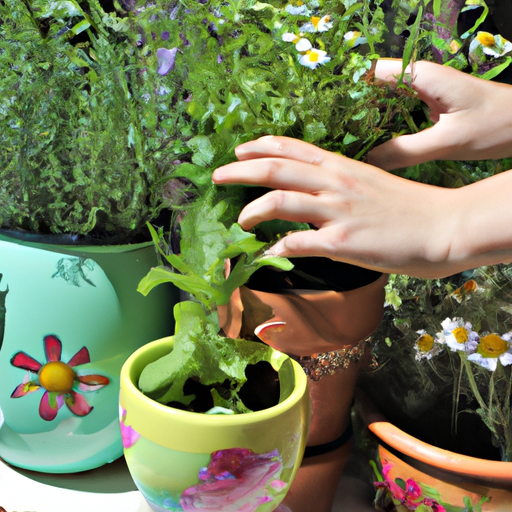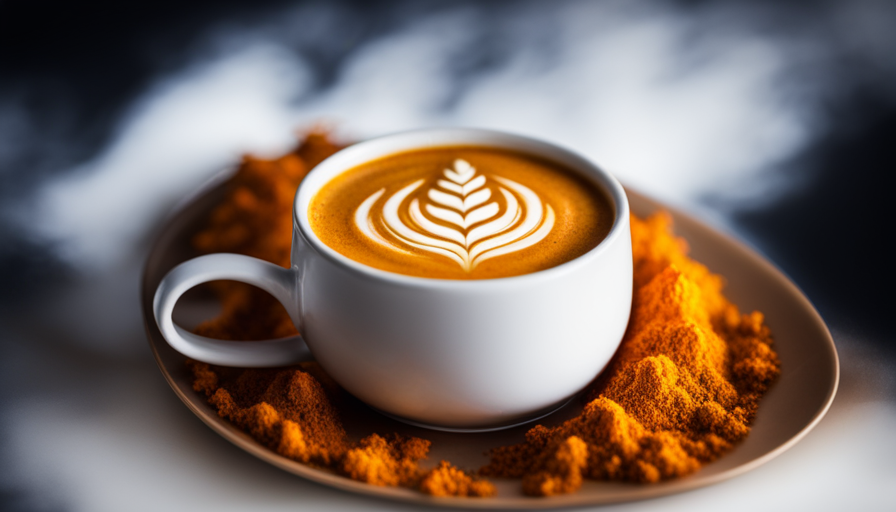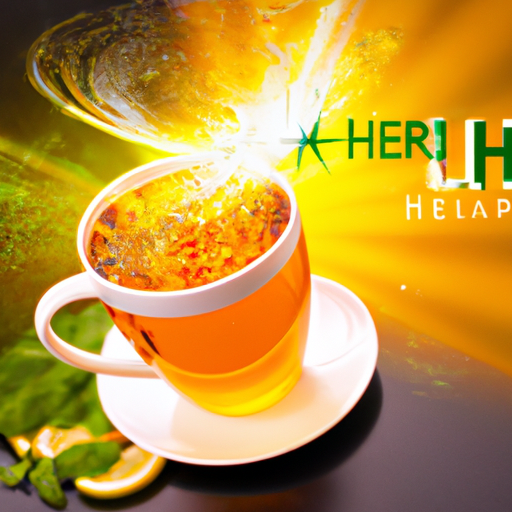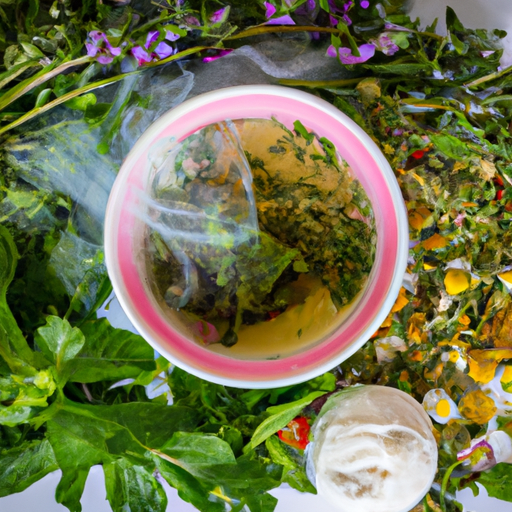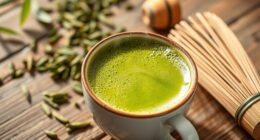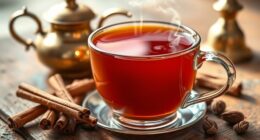Are you in the mood for a comforting cup of tea to relax after a hectic day?
Imagine the satisfaction of knowing that you grew and made that tea yourself, using the freshest and most flavorful herbs from your very own garden.
In this article, I will guide you through the process of growing and making your own herbal tea, step by step.
We will begin by choosing the right herbs for your tea blends, ensuring that you create the perfect combination of flavors and health benefits.
Next, we will delve into the world of herb gardening, providing you with the knowledge and tools necessary to cultivate a thriving garden.
Harvesting, drying, and storing your herbs will be discussed in detail, ensuring that your tea leaves retain their aroma and potency.
Once your herbs are ready, we will explore the art of blending your herbal tea, allowing you to customize your own unique flavors.
Finally, we will cover the brewing and enjoyment of your herbal tea, providing tips and tricks for the perfect cup every time.
Get ready to embark on a journey of taste and tranquility as we unlock the secrets of growing and making your own herbal tea.
Key Takeaways
- Choosing the right herbs for tea blends is important for both flavor and health benefits.
- Creating an herb garden requires selecting a suitable location, preparing the soil, and providing proper watering and sunlight.
- Harvesting herbs at the right time and using proper techniques for drying and storing ensures maximum flavor and potency.
- Experimenting with ratios and complementary flavors can lead to unique and delicious tea blends.
Choose the Right Herbs for Your Tea Blends
When selecting herbs for your tea blends, envision yourself strolling through a fragrant garden, handpicking the perfect combination of leaves, flowers, and spices to create a truly magical infusion.
Not only does growing and making your own herbal tea provide a sense of accomplishment, but it also offers a plethora of health benefits. Herbal tea has been used for centuries to promote relaxation, boost the immune system, aid digestion, and even alleviate common ailments.
Each herb brings its own unique flavor profile to the tea, allowing you to customize your blends to suit your taste preferences. Whether you prefer the soothing notes of chamomile, the invigorating zest of peppermint, or the floral allure of lavender, there are endless possibilities to explore.
By carefully selecting your herbs, you can create a diverse collection of flavors that will keep your tea experience exciting and satisfying.
Now, let’s explore how you can bring these herbs to life in your own herb garden.
Create an Herb Garden
When creating an herb garden, it’s important to select a suitable location that provides the right conditions for your plants to thrive.
Prepare the soil by removing any weeds or debris and adding compost or fertilizer to ensure optimal growth.
Plant your herbs according to their specific needs, spacing them appropriately and providing adequate watering and sunlight to promote healthy growth.
Select a Suitable Location for Your Garden
Choose a spot in your garden that’s bathed in sunlight, where the plants can bask in the warm embrace of the golden rays. This is crucial for the growth and health of your herbal tea garden.
Ensure that the location you select has suitable soil conditions, as herbs thrive in well-drained soil. Proper drainage is essential to prevent waterlogging, which can lead to root rot and other plant diseases.
To convey a deeper meaning for aspiring herb gardeners, remember these key points:
- Sunlight is the life force that powers the growth of your herbs.
- The right soil conditions create a favorable environment for your plants.
- Proper drainage prevents water accumulation and promotes healthy root development.
- Choosing the right location sets the foundation for a successful herbal tea garden.
- A sunny spot with suitable soil and proper drainage is the key to growing vibrant and flavorful herbs.
Now, let’s move on to preparing the soil and planting your herbs in the next section.
Prepare the Soil and Plant Your Herbs
Finding the perfect spot in your garden, where the golden rays of sunlight dance upon the rich soil, is just the beginning of your journey to create a flourishing oasis of aromatic herbs.
To prepare the soil for your herb garden, start by clearing away any weeds or debris. Loosen the soil with a garden fork or tiller, ensuring it’s well-drained and aerated. Adding organic matter, such as compost or well-rotted manure, will enrich the soil and provide essential nutrients for your herbs.
Once the soil is prepared, it’s time to plant your herbs. Dig small holes for each herb, making sure to space them according to their individual needs. Gently place the herb plants into the holes and cover their roots with soil.
Finally, water the newly planted herbs thoroughly to help them settle in their new home. As you move onto the next step of providing adequate watering and sunlight, your herbs will be well-prepared to thrive.
Provide Adequate Watering and Sunlight
Creating a flourishing oasis of aromatic herbs requires ensuring that your herbs receive enough water and sunlight to thrive. It’s important to provide adequate water without overwatering, as excessive moisture can lead to root rot. The frequency and amount of watering will depend on the specific herb and its water requirements. Generally, herbs prefer moist but well-drained soil.
As for sunlight exposure, most herbs thrive in full sun, which means they need at least six hours of direct sunlight each day. However, some herbs, like mint and parsley, can tolerate partial shade.
By providing your herbs with the right amount of water and sunlight, you’re laying the foundation for a bountiful harvest of flavorful leaves and blossoms.
Harvesting Your Herbs
When it comes to harvesting your herbs, it’s important to know the best time to harvest each herb to ensure optimal flavor and potency. Using proper techniques to preserve the plant’s health is also crucial in maintaining its vitality and ensuring a continuous supply.
Harvesting the herbs at their peak flavor and aroma will result in a more enjoyable and flavorful tea experience.
Know the Best Time to Harvest Each Herb
To maximize the flavor and potency of your herbal tea, you’ll want to know the ideal time for harvesting each herb. Timing is crucial as it can greatly affect the taste and benefits of your tea.
Here are four key considerations when deciding the best time to harvest your herbs:
-
Importance of proper drying techniques for harvested herbs: Ensuring your herbs are dried correctly is vital to preserve their flavor and medicinal properties. Proper drying prevents the growth of mold and bacteria, ensuring that your tea is safe and enjoyable to drink.
-
Benefits of harvesting herbs in the morning for maximum flavor: Harvesting your herbs in the morning when the essential oils are at their peak concentration will result in a more flavorful tea. The morning sun helps to enhance the aroma and taste, providing a delightful experience with every sip.
-
Understanding the growth cycle of each herb: Different herbs have varying growth cycles, and it’s important to know when they reach their peak. For example, harvesting basil just before it flowers will give you the best flavor, while mint is most potent when harvested just before it starts to flower.
-
Observing the plant’s appearance and scent: Pay attention to the appearance and scent of your herbs to determine if they are ready for harvest. Look for vibrant leaves and a strong aroma as indicators of optimum flavor and potency.
Knowing the best time to harvest each herb is crucial in creating a delicious cup of herbal tea. Once you’ve harvested your herbs, it’s important to use proper techniques to preserve the plant’s health and maintain the quality of your tea.
Use Proper Techniques to Preserve the Plant’s Health
Using proper techniques to preserve the plant’s health is like giving it a spa treatment, ensuring that it thrives and produces the best quality herbs for your tea.
Preserving plant vitality is essential to maximize the benefits of herbal tea. To achieve this, it’s crucial to provide the right growing conditions, such as adequate sunlight, water, and nutrients.
Regular pruning and removing dead or diseased parts of the plant also contribute to its overall health. Additionally, protecting the plant from pests and diseases through organic methods like companion planting or using natural insect repellents is crucial.
By maintaining the plant’s health, you’re ensuring that it can grow and flourish, providing you with herbs that are bursting with flavor and aroma.
Harvesting the herbs at their peak flavor and aroma is the next step in creating the perfect cup of tea.
Harvest the Herbs at Their Peak Flavor and Aroma
Harvesting herbs at their peak flavor and aroma ensures a delightful infusion in every cup of tea. To maximize flavor, it’s crucial to pick the herbs at the right time. Here are three key tips to help you achieve the best results:
-
Timing is everything: Harvest herbs early in the morning, just after the dew has dried, to capture the highest concentration of essential oils.
-
Choose the perfect stage: Harvest when the plants are in full bloom, as that’s when they’re at their most flavorful.
-
Snip, don’t pull: Use sharp scissors or pruning shears to carefully cut the stems, avoiding any damage to the plant.
By following these techniques, you can create herbal tea recipes that burst with flavor.
In the next section, we’ll explore the essential steps for drying and storing your herbs, ensuring their longevity and preserving their taste.
Drying and Storing Your Herbs
Once you’ve gathered your fresh herbs, it’s time to dry and store them to ensure a long-lasting supply of flavorful herbal tea.
There are various herb drying methods you can choose from, depending on the type of herb and the resources available to you. One common method is air drying, where you hang your herbs upside down in a cool, well-ventilated area until they are completely dry.
Another option is using a dehydrator, which speeds up the drying process by gently removing moisture.
Once your herbs are dry, it’s important to store them properly to maintain their flavor and aroma. Herb storage techniques include keeping them in airtight containers away from direct sunlight and moisture. This will help to preserve their freshness and potency.
Now that you have your dried herbs ready, let’s move on to the next step of blending your herbal tea.
Blending Your Herbal Tea
To create a unique and flavorful blend, you’ll need to artfully combine a variety of dried herbs and spices. There are different methods of tea blending that you can explore to find your perfect combination.
One method is to experiment with different ratios of herbs to create a balanced flavor profile. You can also try blending herbs with complementary flavors to create interesting and unique combinations. For example, pairing chamomile with lavender or mint with lemon verbena can result in delightful flavor combinations.
Don’t be afraid to get creative and think outside the box when blending your herbal tea. The possibilities are endless! Now that you have your custom blend, let’s move on to brewing and enjoying your herbal tea.
Brewing and Enjoying Your Herbal Tea
Now that you’ve blended your unique combination of herbs and spices, it’s time to brew and savor the delightful flavors of your herbal infusion. To ensure the best results, follow these brewing techniques:
- Water Temperature:
Different herbs require different water temperatures. For example, delicate herbs like chamomile and lavender should be brewed with water just below boiling point, whereas heartier herbs like rosemary and thyme can handle boiling water.
- Steeping Time:
The length of time you steep your herbal tea affects its flavor and strength. Generally, steeping for 5-7 minutes will yield a balanced infusion. However, if you prefer a stronger flavor, you can steep for longer.
Not only does brewing your own herbal tea allow you to enjoy its flavorful taste, but it also provides numerous health benefits. Herbal teas are known to promote relaxation, aid digestion, boost immunity, and reduce inflammation.
Now that you know how to brew your herbal tea, let’s move on to some tips and tricks for successful herbal tea making.
Tips and Tricks for Successful Herbal Tea Making
When it comes to successful herbal tea making, there are a few tips and tricks that I’ve discovered along the way. One of the most helpful practices is keeping a journal to record my favorite blends and recipes. This not only helps me replicate successful combinations but also allows me to experiment and create new ones.
Additionally, sharing my herbal tea with friends and family is a great way to spread the joy and benefits of this wonderful beverage. It also provides an opportunity to receive feedback and suggestions for improvement.
Lastly, continuously expanding my herbal tea knowledge and skills is essential for becoming a proficient tea maker. Whether it’s through reading books, attending workshops, or experimenting with different ingredients and brewing techniques, there’s always something new to learn and explore in the world of herbal tea.
Keep a Journal to Record Your Favorite Blends and Recipes
Luckily, by keeping a journal, you’ll be able to savor the memories of your favorite herbal tea blends and recipes for years to come. Not only does it serve as a delightful record of your tea journey, but it also allows you to track the benefits of herbal tea on your overall well-being.
Documenting the various flavors you’ve explored and the unique combinations you’ve concocted will help you recreate those delightful brews whenever you desire. In your journal, you can include detailed notes on the herbs and spices used, the steeping time, and any adjustments you made to the recipe. This way, you can fine-tune your blends based on personal taste preferences.
So, grab a pen and start journaling your tea adventures, and soon you’ll have a treasure trove of recipes to share with your friends and family.
Share Your Herbal Tea with Friends and Family
Invite your loved ones to partake in the joy of herbal tea by sharing a cup of its aromatic and soothing goodness. Hosting a tea party is a delightful way to introduce your friends and family to the world of herbal tea.
Decorate your space with cozy cushions and soft lighting to create a warm and inviting atmosphere. Serve a variety of herbal tea blends, such as chamomile, peppermint, and hibiscus, along with delicious treats like scones and finger sandwiches.
Share the health benefits of herbal tea, such as its ability to boost the immune system and aid digestion. Encourage your guests to try different blends and discuss their favorite flavors.
Tea parties are not only enjoyable, but they also provide an opportunity to learn and appreciate the diverse flavors and benefits of herbal tea. As you continuously expand your herbal tea knowledge and skills, you’ll discover new blends and recipes to share with your loved ones.
Continuously Expand Your Herbal Tea Knowledge and Skills
Explore new blends and techniques to expand your understanding and mastery of herbal tea, unlocking a world of flavors and possibilities for you to enjoy. One way to continuously expand your herbal tea knowledge is by exploring new herbal tea recipes. Experiment with different combinations of herbs and spices to create unique and delicious flavors. You can also research the health benefits of various herbs and incorporate them into your blends to expand the benefits of your herbal tea. Another way to expand your herbal tea skills is by learning new techniques. Try different brewing methods such as steeping, infusing, or cold brewing to discover new tastes and aromas. Additionally, consider attending workshops or classes, reading books or articles, and connecting with other herbal tea enthusiasts to learn from their experiences. By continuously expanding your herbal tea knowledge and skills, you can enhance the benefits and enjoyment of your homemade herbal teas.
| Explore New Blends | Expand Your Benefits |
|---|---|
| Try different combinations of herbs and spices | Research health benefits of herbs |
| Create unique and delicious flavors | Incorporate beneficial herbs into blends |
| Experiment with brewing methods | Learn new techniques |
| Attend workshops or classes | Connect with other enthusiasts |
Frequently Asked Questions
How long does it take for herbal tea plants to grow and be ready for harvest?
Herbal tea plants have varying growth rates, but on average, they take around 3-6 months to reach optimal harvest time. Factors like plant variety, growing conditions, and climate can influence the exact timing.
Can I use dried herbs from the grocery store to make herbal tea?
Yes, you can use dried herbs from the grocery store to make herbal tea. Dried herbs are convenient and have a longer shelf life. To preserve and store them, keep them in airtight containers away from light and moisture.
Are there any specific herbs that are not recommended for making herbal tea?
There are some herbs that are not recommended for making herbal tea due to potential side effects. These include comfrey, pennyroyal, and ephedra. Consuming these herbs in tea form can lead to liver damage, miscarriages, and heart problems.
Can herbal tea be consumed by pregnant women or individuals with certain medical conditions?
Pregnant women should be cautious when consuming herbal tea, as some herbs can cause complications. Additionally, herbal tea may interact with certain medications, potentially reducing their effectiveness. It’s important to consult with a healthcare professional before consuming herbal tea.
How can I add flavor to my herbal tea without adding sugar or sweeteners?
To enhance the flavor of herbal tea without using sugar or sweeteners, I explore alternative ways. Natural ingredients like citrus zest, fresh herbs, spices, and fruit slices can be added to infuse the tea with delicious taste.
Conclusion
In conclusion, growing and making your own herbal tea is a rewarding and fulfilling experience. By carefully selecting the right herbs for your blends, creating an herb garden, harvesting and drying your herbs, and blending them together, you can create unique and delicious tea combinations that cater to your personal taste and health needs.
With a little patience and practice, you can brew and savor the soothing flavors of your homemade herbal tea. So why not embark on this herbal adventure and let your creativity bloom like a garden in full bloom?

